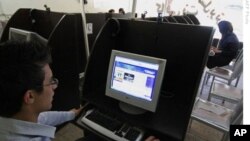The United States has amended sanctions regulations which banned the transfer of some kinds of communications technology to Iran, Cuba and Sudan. According to a statement by the U.S. Department of Treasury, the move was made "to ensure that individuals in those countries can exercise their right to free speech and information to the greatest extent possible."
U.S. companies will now be able to legally export certain free services and software related to the exchange of personal communications over the internet, including web browsing, blogging, e-mail, and social networking.
U.S. Deputy Treasury Secretary Neal Wolin said, "As recent events in Iran have shown, personal internet-based communications ... are powerful tools. This software will foster and support the free flow of information – a basic human right – for all Iranians."
The U.S. move comes as the Iranian government has stepped up its efforts to restrict access to the internet and web-based services in the wake of anti-government protests that have taken place since Iran’s disputed presidential election in June. The regime has blocked thousands of domestic and international websites and limited access to mobile telephone, e-mail and text messaging systems. In addition, it has extended the reach of its Press Law, which controls and regulates media in Iran, to include "internet publications," making bloggers vulnerable to charges of crimes against national security.
U.S. Secretary of State Hillary Clinton said that amending restrictions on companies so they can provide internet tools to the people of Iran is important:
"So they can communicate, so that they can have other sources of information about what is going on inside their country. We believe that Iran calls itself a democracy – it should act like one, and that means respecting the right to free expression and assembly of its own people. And in the 21st century, expression and assembly are carried out on the internet as well as in person."
The U.S., said Secretary of State Clinton, will "continue to support those This software will foster and support the free flow of information – a basic human right – for all Iranians."
Assisting Free Expression In Iran

The United States has amended sanctions regulations which banned the transfer of some kinds of communications technology to Iran, Cuba and Sudan.


















